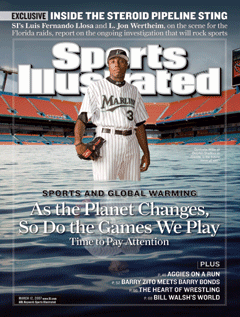Not the Swimsuit Edition
Air Date: Week of March 16, 2007

SI Cover (Courtesy of Sports Illustrated)
Sports Illustrated’s recent cover story documents the effects of climate change on the sporting industry, and it’s not just a problem for dogsledders. Athletes in sports ranging from nordic skiing to football are changing the way they play to adapt to a changing climate. Host Steve Curwood speaks with David Epstein, co-author of “Going, Going Green.”
Transcript
CURWOOD: The recent issue of Sports Illustrated Magazine has a provocative picture on its cover and no, it’s not a model in a swimsuit. It’s Florida Marlins ace pitcher Dontrelle Willis, standing in the outfield of his home stadium up to his thighs in water. It’s a virtual image, of course, but it’s a stark representation of the threat that climate change poses to places like Miami and to the world of sports—something that’s supposed to be an escape from “real life.”
The cover story is titled: Going, Going Green and it documents the way global warming is already affecting sporting events from skiing to dog-sledding to football. Reporter David Epstein is co-author of the article and he joins me now from the offices of Sports Illustrated in New York City. Hello David.
EPSTEIN: Hi.
CURWOOD: Give me some examples of how climate’s affecting athletes and their sports.
EPSTEIN: Well, I mean everything from when we have an extraordinarily hot summer, even when it’s just a couple of degrees makes a big difference for say high school football players. I mean I talked to some coaches, Texas high school football, and they said, you know Texas high school used to be famous for this kind of two-a-day sweating players into shape stuff. And now it’s like, you just don’t see that. You might still see two practices a day but if so, you’re going to see one early in the morning before the sun’s up, one late at night or sometimes, you know, you’re just going to see one at night rather than two a day.

David Epstein (Courtesy of David Epstein)
All the way to things like the World Cup, the World Cup skiing was basically decimated this year. The US Nordic ski team came home early from the European circuit because they never knew if the race was going to be on or not. And I think actually right now, I don’t know if the Iditarod is still going. It might be or it might be just ending.
CURWOOD: It is, yeah.
EPSTEIN: And they used to traditionally would start in a town called Wasilla, which calls itself the home of the Iditarod. It hasn’t started there for five years because they don’t have enough snow. They’ve had to move it North every year. It’s kind of a business problem for them. It’s their biggest tourist draw. So it’s you know, it’s like halloween for a costume store or something. They haven’t had it any more and I wonder when the next time will be. It’s kind of all over the sports world.
CURWOOD: Now, in the article that you helped write you point out that even the symbols of athletic competition are changing. I mean we don’t think of the superdome in New Orleans the way we did before Katrina do we?
EPSTEIN: No certainly, I mean it’s, I mean, even me as a sports fan, when I hear the superdome the first thing I think of is a refuge. I think of that picture where I guess the wind had ripped a hole through the roof and there’s a kid that’s running through the light that’s shining through the roof. I think it, ah, kind of puts it into perspective. Hopefully we won’t see more of that but it certainly changes the meaning of the superdome no doubt.
CURWOOD: So how’s the athletic industry, I’m thinking of everyone from athletes to facilities managers, team owners, how’s everyone dealing with these new challenges associated with climate change?
EPSTEIN: Well it depends. Kind of out on their own. There’s not a cohesive movement right now. Well in some sports there are. Let’s say in some of the driving sports, which maybe can make a big difference. In the clean air act of 1970 which said, you know, new consumer cars would have to run on unleaded fuel, race cars were actually exempt so they don’t have to comply with that. But NASCAR is now going to comply with it anyway and they’re mixing in ethanol into their fuels. And Indy Car is going to 100 percent ethanol, and F-1 is introducing hybrids and ethanol, things like that. And obviously their emissions are a drop in the bucket but how far is it from a NASCAR driver to a NASCAR fan in terms of being conscious about ethanol.
And athletes themselves in the major sports lots of them do philanthropic work but it tends to be more focused on poverty as opposed to environmentalism. But now it’s starting to change a little bit. Like Steve Gleason, who’s a safety on the Saints he had a biodiesel Jetta, I believe it was, and it was flooded by Katrina and when he got rid of that he said he thought about getting a Prius but then he said, “You know I like cool cars,” so he got himself a truck and he runs it on biodiesel. So he sees himself as an example now. He says, “You can have a cool truck and still have a clean truck.” He started a foundation called One Sweet World that’s devoted to sustainability and, as far as I know, that’s kind of the first in football, basketball, baseball players who’s started an environmental foundation and I think it’s a sign of things to come.

(Courtesy of Sports Illustrated)
CURWOOD: Tell me, what is it that got Sports Illustrated interested in doing this story? What do you think really started the ball rolling?
EPSTEIN: Basically we’re really well in touch with sports. And we realized that there are enough ways that sports were being affected and enough ways that sports and athletes were reacting that it had become, no question, it had become relevant to sports fans. And actually we drew some real criticism for ruining people’s kind of escapism I guess with sports. But it’s here. These sports are being affected. These ski slopes are moving. The Iditarod is moving. The NFL is planting trees to offset their carbon and things like that. And obviously the superdome, of course you can’t tie any single event to global warming but we know that, you know, it’s more likely that we will have hurricanes like that. Enough things are happening for the people who are paying attention to sports that we should be having that conversation now so that maybe that will change.
CURWOOD: David Epstein is a reporter for Sports Illustrated Magazine. Thank you so much David.
EPSTEIN: Thank you.
Links
Living on Earth wants to hear from you!
Living on Earth
62 Calef Highway, Suite 212
Lee, NH 03861
Telephone: 617-287-4121
E-mail: comments@loe.org
Newsletter [Click here]
Donate to Living on Earth!
Living on Earth is an independent media program and relies entirely on contributions from listeners and institutions supporting public service. Please donate now to preserve an independent environmental voice.
NewsletterLiving on Earth offers a weekly delivery of the show's rundown to your mailbox. Sign up for our newsletter today!
 Sailors For The Sea: Be the change you want to sea.
Sailors For The Sea: Be the change you want to sea.
 The Grantham Foundation for the Protection of the Environment: Committed to protecting and improving the health of the global environment.
The Grantham Foundation for the Protection of the Environment: Committed to protecting and improving the health of the global environment.
 Contribute to Living on Earth and receive, as our gift to you, an archival print of one of Mark Seth Lender's extraordinary wildlife photographs. Follow the link to see Mark's current collection of photographs.
Contribute to Living on Earth and receive, as our gift to you, an archival print of one of Mark Seth Lender's extraordinary wildlife photographs. Follow the link to see Mark's current collection of photographs.
 Buy a signed copy of Mark Seth Lender's book Smeagull the Seagull & support Living on Earth
Buy a signed copy of Mark Seth Lender's book Smeagull the Seagull & support Living on Earth

